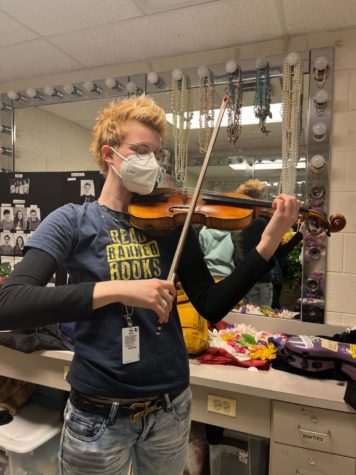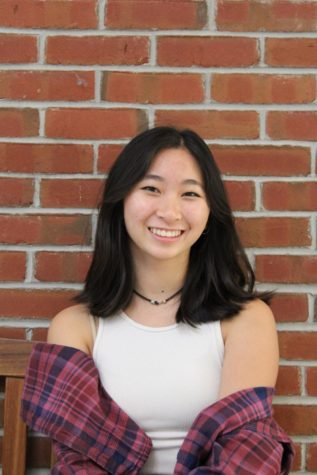“We are not going to be able to solve any justice crisis if we cannot solve the climate crisis”
March 28, 2022

Every evening, Eleanor Clemens-Cope unbuckles her purple plastic case, adorned with political stickers shouting slogans like, “DEFEND DREAMERS,” and “Only YOU can prevent climate change.” The loud, vibrant and urgent manner of the case seems to contrast with the violin inside, and the smooth classical notes she pulls from the instrument. Clemens-Cope then spends the next three hours deep in practice, a dedication that has brought her to the position of Youth Chamber Fellow at the Strathmore National Symphony Orchestra. She approaches playing the violin in a methodical way, starting with an hour of scales, then tackling new pieces and working through difficult sections.
Clemens-Cope, who plans to attend Princeton University in the fall, is a high school senior and rising climate activist with a passion for the violin, public speech and quirky political apparel. As a member of her high school’s debate team, she brings an intensely focused and rapid-fire manner to her speech, like the staccato notes of a swelling G-minor run.
How did you find your style?
I do what I want to do. I kind of, like, decided that I wanted short hair when I was in eighth grade, I cut it all off over the summer. And then I came back. And everybody immediately said, I cannot imagine you any other way. And it’s been short and spiky and dyed ever since. I wear a lot of political clothing so people know what they’re getting into- I wear my message on my sleeve, pretty literally. I’m currently wearing a “read banned books” shirt with a list of banned books- a little reading list- on the back for you.
What got you involved in climate activism?
Yeah, it was actually my younger sister who’s five years younger than me, Rosie, she came to me one day. And she was like, ‘I know that you already do a bunch of organizing; for justice, for religious freedom for Muslim students in schools.’ [She] was like, ‘I know that you already do all this work, but I am really worried about the climate crisis,’ because she had seen a report on it. And she told me, ‘I think that if we can’t solve the climate crisis, we can’t solve any of our justice struggles.’ And I’m kind of like a do the math to do the reading kind of analytical person. So I went, I read a bunch of articles, I read the IPCC report, and decided that she’s absolutely right, that we are not going to be able to solve any justice crisis if we cannot solve the climate crisis.
And so that’s when I started organizing with her and with the Sunrise movement nationally, which is a movement of young people under age 35, united for the Green New Deal, which would bring climate jobs adjusted for all people of the United States. And also with the Sunrise Rockville hub, which I co-run with a bunch of other people, we are fighting for a Green New Deal for Montgomery County.
What’s something you want to contribute to and see happen in your lifetime?
Yeah, so a Green New Deal. First, just talking about what it does will provide a lot of things. It’s a plan in three parts: climate, jobs, and justice. We solve the climate crisis, we do it by creating a lot of good-paying, unionized, good benefits, good hours of jobs, that are high quality for Americans. And third, it will bring justice to communities that have historically been marginalized and oppressed. So that’s making sure that it’s anti-racist policy, making sure that it gives us gender justice, age justice, all kinds of different things like that. But aside from just the things that can be encapsulated in the Green New Deal, I’m also really excited about, again, this is kind of the nerd thing coming out, which is the promise that our new kind of theory of spending by the federal government, economists are starting to think that the federal government can do a lot more spending than it’s already been doing. And, you know, they have to figure out some things about that, such as inflation going forward. However, now that we know that the federal government has this power, you spend more money to fix everyday people’s problems. That is such a powerful tool to bring good lives and good quality of life to all people.
So why do you care about these issues? And how do you convince other people to care about them?
I care about these issues because I care about people. I love people. I don’t want to see people come to harm and I am ready to do most anything to make people’s lives better. And it can be frustrating when people in power don’t recognize problems like the climate crisis. You know, when you go to a politician, and the politician says, ‘Oh, that’s a problem for tomorrow,’ or ‘Oh, I don’t really want to deal with it today,’ or, you know, ‘I don’t have the power to do that right now.’ And the way that we convince these politicians, the way that we as young people know that the climate crisis is the problem, you know, and that we need to solve it now, it can’t always be waiting for tomorrow or it will be too late.
The way that we go about convincing them is through massive people power. We build a base of enthusiastically supportive people in our location, we talk to candidates for elected offices, we talk to elected officials, we talk to policymakers, we talk to all those kinds of people to ask them for what we want. And if they don’t give it to us, we go into the streets, we take action. I’ve been arrested for climate civil disobedience, many people I know have been arrested for climate civil disobedience. So those are the lengths that we are willing to go to, to show politicians to show people in power, what the problem is, and what they need to do about it, and how willing we are to make this happen.
On a slightly different note, why do you play the violin?
I play the violin, for that same reason, because I love people. I love connecting people. I love the way that music can do that. When I was a little kid, and I had just started violin, you know, three and a half years old, I was really bad at it. I was just very untalented, but I stuck with it. Because I saw the people who were playing very well, playing the Bach concerto, I could see how they could connect themselves to an audience in a way that was greater than just that experience. And that was really, like, such an important thing for me to see and realize what that could be. And so I [practiced] over many, many, many years. Kind of by the time I was like 12, I could see it starting to happen, like, in myself. Like sometimes when I played something people would feel, that became like a self-feeding cycle where I saw how it could connect me to other musicians and how it could connect to audiences and help connect other people to each other. And I just kept going. And so that’s where I am today, just trying to connect people in an audience.


